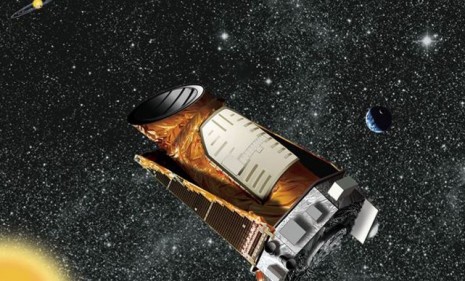The Milky Way's 500 million potentially habitable planets
The first cosmic census of our galaxy says that we are surrounded by 50 billion planets, including half a billion on which life could exist

A free daily email with the biggest news stories of the day – and the best features from TheWeek.com
You are now subscribed
Your newsletter sign-up was successful
The Kepler telescope — the same device that discovered a "super earth" last year — has mapped more than 1,200 planets in one tiny corner of our Milky Way Galaxy. Based on that sample, scientists say that there are approximately 50 billion planets in the entire galaxy, including 500 million that are theoretically capable of sustaining life. Here, a quick guide to the findings:
What exactly did the Kepler telescope find?
It has discovered 1,235 exoplanets, or planets like ours, that revolve around a sun, in an area that represents around 1/400th of the Milky Way. By extrapolating these numbers, the Kepler team has estimated that there are at least 50 billion exoplanets in our galaxy — 500 million of which sit inside the habitable zones of their suns, the area that it is neither too hot nor too cold to support life and is sometimes called the "Goldilocks zone."
The Week
Escape your echo chamber. Get the facts behind the news, plus analysis from multiple perspectives.

Sign up for The Week's Free Newsletters
From our morning news briefing to a weekly Good News Newsletter, get the best of The Week delivered directly to your inbox.
From our morning news briefing to a weekly Good News Newsletter, get the best of The Week delivered directly to your inbox.
50 billion? Sounds like a lot.
Indeed. But in fact, it's a "very conservative estimate," says Mark Brown at Wired. It assumes that there is only one planet to each star. But "that's not always the case" — for evidence, look no further than "our own monstrous eight-planet solar system." The true figure could be far higher.
With that many planets, aliens must exist, right?
It's not that simple, says Ian O'Neill at Discovery. We only know of one planet in the Milky Way that sustains life — "Earth, in case you were wondering" — so "no amount of statistical guesswork can arrive at an estimation for the number of alien beings that are out there." That said, "it's hard to believe that we could be all alone in a galaxy so teeming with worlds," says Alasdair Wilkins at IO9.
A free daily email with the biggest news stories of the day – and the best features from TheWeek.com
But this is just in one galaxy, right?
Yes — and astronomers believe there are 100 billion galaxies in the universe. If you want to extrapolate those numbers, that means there are around 50,000,000,000,000,000,000 (50 quintillion) potentially habitable planets in the universe.
-
 How the FCC’s ‘equal time’ rule works
How the FCC’s ‘equal time’ rule worksIn the Spotlight The law is at the heart of the Colbert-CBS conflict
-
 What is the endgame in the DHS shutdown?
What is the endgame in the DHS shutdown?Today’s Big Question Democrats want to rein in ICE’s immigration crackdown
-
 ‘Poor time management isn’t just an inconvenience’
‘Poor time management isn’t just an inconvenience’Instant Opinion Opinion, comment and editorials of the day